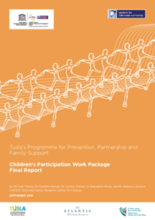

Displaying 991 - 1000 of 1648
This study reports on a large quantitative, descriptive study focusing on children in contact with children’s services on a single date in 2015 across the four UK countries (England, Northern Ireland, Scotland and Wales).
This study reports on a large quantitative, descriptive study focusing on children in contact with children’s services on a single date in 2015 in the four UK countries (England, Northern Ireland, Scotland and Wales) to provide a potential ‘natural experiment’ for comparing intervention patterns.
An agency in Sussex, UK called Project Abroad has stopped sending volunteers abroad on orphanage placements because of concern about "fake orphans," according to this short video from BBC News.
This book presents the stories of youth in care, though not in splendid isolation, but as interactively produced, turn by turn in interviews, and in conversations with other youth.
This article describes the experiences of Muslim children in care in the UK and critically examines how their situation matches the definitions of good practice in agencies and professionals seeking to help them.
This article sets out the rationale for the Reflective Fostering Programme (RFP), outlines its key elements and concludes by indicating future service implementation and a planned feasibility study examining this approach.
The current study addressed gaps in evidence of growing early intervention in the form of out of home care through a comparison of two samples of children in Scotland: 110 children born in 2003 and 117 born in 2013, all of whom were placed under compulsory measures of supervision prior to three years of age.
This paper presents findings from an independent study of Ofsted inspections into children's social care in England, covering reports under three inspection frameworks during the period 2009 to 2016.
This thesis study aimed to explore what Looked After Children (LAC) value in their friendships in order to understand what support may help them gain the maximum benefits from these relationships.
This evaluation study focuses on the implementation of and the outcomes from the Programme for Prevention, Partnership and Family Support (PPFS) programme, a programme of action being undertaken by Tusla, the Child and Family Agency of Ireland.

